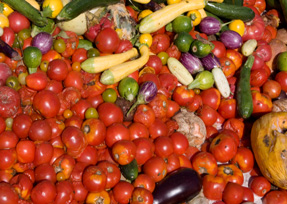Organic waste can be converted into compost or humus and used as a fertilizer.
Organic waste can be recycled by making a compost heap in a pit in the soil, or by using a compost bin. Garden waste and raw kitchen waste, along with straw, shredded newspaper or wood chips can be mixed to in a compost heap. This mix should be stirred every three weeks so that the heap is aerated and decomposition happens faster and evenly. It should be kept moist all the while by adding water if necessary. Once the compost has turned dark brown and appears loose to touch, it can be added to the soil as a fertilizer. This way, the garden needs less water and the compost improves the soil quality as well. Earthworms introduced into these compost piles eat through the organic matter, break them down and hasten the decomposing process. This is an inexpensive and harmless way of garbage decomposition. The end product or castings are odorless, gentle on the soil, safe, function as excellent fertilizers, and contain five times more nutrients than normal soil. For better results it is best to avoid adding cooked food with meat or dairy products to the compost heap as these can be odorous when they decompose.
Other recycling tips
Rather than throwing away surplus or left over food, restaurants can give away this food to the needy (homeless shelters and soup kitchens), and thereby keep it away from landfills.
College campuses can recycle the organic waste from their cafeteria and lawn and hedge trimmings to compost and use it as fertilizer. This is not only environment friendly, but also saves money that would otherwise be spent on procuring artificial fertilizers.
Manure from dairy farm can be converted in an anaerobic digester to biogas which can in turn be used to produce electricity. The heat produced as a byproduct of this process can be utilized to heat water for the whole farm.










